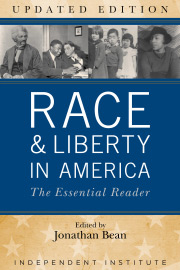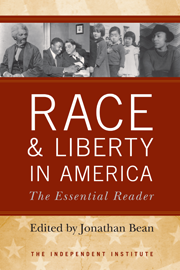On Thanksgiving weekend, Americans ought to remember those who carried the torch of freedom during times of moral darkness.
One of those rare individuals was R.C. Hoiles, born on Nov. 24, 1878, the founder of Freedom Communications Inc. and co-publisher of the Register, with his son Clarence, from 1935 until his death in 1970.
R.C. Hoiles stood for freedom at two especially critical times in U.S. and California history—when much of the public wanted to and the federal government did—intern Japanese-Americans in World War II, and later, when a local school board fought to continue the practice of segregating Mexican children from Anglo students.
By such opposing acts of state racism, Hoiles embodied the long tradition of classical liberalism (which is really what the philosophy that came to be called libertarianism most resembles) in the civil rights movement.
Along with Frederick Douglass, Rose Wilder Lane, Branch Rickey and many others, Hoiles believed that individual rights belong to each person regardless of race, and that, furthermore, the government was the single greatest source of racial discrimination.
As I write about in my book “Race and Liberty,” these old-style liberals—like their counterparts today (think Ward Connerly)—believed in individual freedom, Christianity, the Constitution, colorblindness and capitalism. These core beliefs were fundamental to the civil rights movements that abolished slavery, tore down the walls of segregation and opened America to immigrants.
In 1942, Hoiles ran seven newspapers nationwide, including what is now The Orange County Register. Hoiles judged issues based on how they corresponded to core principles of the Judeo-Christian tradition (especially what are called the Coveting Commandments and the Golden Rule) and classical liberalism—the touchstones of his Freedom Philosophy. The following passage from “Here is our Policy,” editorial guidelines for the newspaper chain first developed by R.C. in the mid- to late 1950s and modified over time:
“1. That every man is born with certain inalienable rights.
“2. That these rights are equally the birthright of all men, that they are the endowment of the Creator and not of any government.
“3. Since we believe these facts are expressed in the Commandments, we do not believe any man has the moral right to curtail the rights of his brother. That is, no man has the right to initiate force against his brother ... .”
THE JAPANESE INTERNMENT
There are always those who believe that some people are more equal than others—and if given power will find a reason to discriminate against them. Thus, President Franklin D. Roosevelt ordered the internment of Japanese-Americans in 1942.
It was justified as a war measure, but FDR’s hostility toward the Japanese predated the attack on Pearl Harbor. As early as 1925, he wrote in a newspaper column that the presence of Japanese in California was a “nightmare” that posed a danger of racial intermarriage. Noting “repugnance” at the idea, FDR wrote “the mingling of Asiatic blood with European or American blood produces, in nine cases out of 10, the most unfortunate results.”
Hoiles rejected Roosevelt’s racism as rooted in un-American notions that denied the “inalienable rights” of individuals.
On Oct. 14, 1942, Hoiles quoted from a Christian Advocate article that “few, if any, people ever believed that evacuation of the Japanese was constitutional. It was a result of emotion and fright rather than being in harmony with the Constitution and the inherent rights that belong to all citizens.... We must realize, as Harry Emerson Fosdick so wisely said, ‘Liberty is always dangerous but it is the safest thing we have.’“
As the Japanese American Citizens League once put it, Hoiles “was the only one with the courage of his convictions.”
SCHOOL DESEGREGATION
Five years later, the federal courts in California sided with the NAACP in a decision that was the trial run for Brown v. Board of Education. Federal Judge Paul McCormick cited California law and the federal Constitution in striking down the practice of segregating Mexican-American schoolchildren ( Mendez v. Westminster).
This was an important civil rights victory, yet R.C. Hoiles saw the larger picture: It was compulsory schooling itself that resulted in the state empowering the worst in people. On April 16, 1947, Hoiles let loose, shaming the school board members for their immoral actions—all made possible, he argued, because they represented the rule of men, rather than the rule of law. Hoiles wrote that “the 9th U.S. Circuit Court of Appeals unanimously ruled against the board of education. They denounced the practice of segregation as a ‘vicious principle’ and denounced school trustees as violating their oaths of office.”
Moreover, Hoiles went on, “it seems that the Santa Ana School Board [the lawsuit was named after one family and one school district, but was filed on behalf of 5,000 children in four districts including Santa Ana] knows no law except might makes right. The members of the board thought they had the power and they wanted to use it. They were not stopped because of their beliefs in Christian, moral and American principles; they had to be stopped by the court ruling against their desire to show their authority. The 14th Amendment to the Constitution prevented them from continuing their un-American, un-Christian desires.”
Hoiles argued that public schools themselves breed a desire for power: “But that is the natural result of compulsory education. Men of this type are the kind that are usually on every board of education in the United States—self-seekers who want power; who want to appear to be leaders; who are willing to violate their oaths of office in order to let their will prevail.
“If this rebuke is not evidence of the contention of this newspaper that the state cannot educate the youth of the land from a moral standpoint, and instead of retarding crime state education will increase it, then there is no such thing as evidence.”
The next time we are tempted to deny others their freedom, we might consider the words of R.C. Hoiles, a man who carried the torch of freedom by repeating timeless principles. The lesson of his life: Embrace freedom and never let go, even when it is unpopular. You will earn the respect of your enemies and the admiration of your supporters. For this and more, I say, “Thank you, Mr. Hoiles.”









